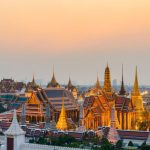People are frustrated, tourists are confused, and business owners are anxious the holiday season will fall short. That much is clear, before the story even begins.
Although Thailand is one of the world’s favourite party-and-beach destinations, the government’s newly enacted Alcohol Beverage Control Act has shifted nightlife owners, bar managers and restaurant operators into the role of amateur interpreters of the legal code. The rules replaced the prior framework on October 8, and instead of clarity, they have sown chaos.
Tourism Operators: “Who Can Explain Some of The Rules?”
Khaosod reports that businesses on Khaosan Road – one of Bangkok’s most well-known backpacker nightlife nodes – are confused about what is permitted, what is prohibited and what penalties could be applied.
President of the Khaosan Road Business Association, mentioned this could really impact revenue:
“If the government isn’t fast enough, tourists are just going to pick another country.”
During this season, for a peak holiday period, the streets are extraordinarily quiet. Sa-nga commented that usually, spending would increase by 20-30 percent by the end year, and even close to 50% in certain areas. In November? “Almost empty.”
The law was intended to bring alcohol regulations up-to-date after the government lifted an old rule on prohibiting alcohol sales from 2 PM to 5 PM that dated back to the military junta.
In theory, the new system is supposed to be flexible. Provinces have more control, local committees can develop local alcohol regulations, and tourist places such as Phuket could legally stay open until later in the night.
Sounds good, right?
Except… No One Issued the Follow-Up Regulations
Chanin Rungtanakiat, deputy secretary-general of the opposition Pheu Thai Party, says the disarray is happening because the government simply forgot about one little thing: updating the secondary regulations to make the new law actually function.
New system, old rules — a disaster in the making.
He suggests that the prime minister should also remove all remaining constraints on alcohol sales in tourist zones. The limitations currently come from laws from 1992, which almost everyone agrees are now outdated.
Small Brewers Were Supposed to Enjoy The Benefits Too
The ironic part? The law was also supposed to allow local craft producers, small breweries, and independent distillers to promote their beers, ciders, spirits, or other alcohol products more freely.
But the official rollout never happened, so the advantage never really appeared.
More red tape, no freedom.
Thailand’s tourism industry is one of the country’s biggest economic drivers. When tourists get confused by rules, or don’t know if it’s permissible to order a drink after midday, they opt for flights to places with less confusion — Vietnam, Indonesia, or the nearest party-friendly Malaysia.
Small business owners are worried that a hazy bureaucratic environment will turn high-spending foreign visitors away just when the country needs them the most.
The tourism industry sends a clear and simple message in response to the persistent uncertainty:
Clarify the rules. Relax restrictions in tourist locations. Don’t let hazy laws deter foreign visitors during high season.
Each day of delay equals lost revenue. And for Thailand, a heavily tourism-dependent economy, lost revenue translates to real damage.




